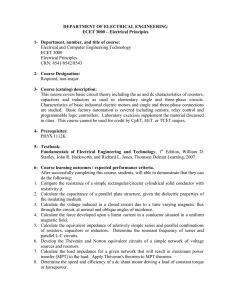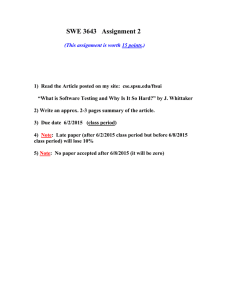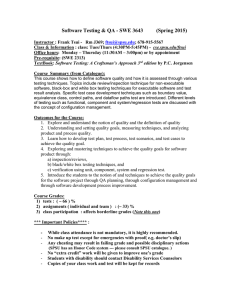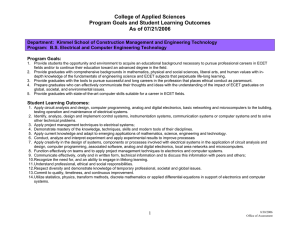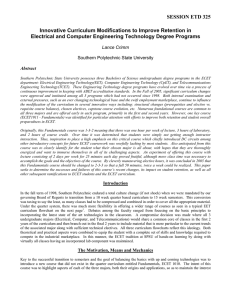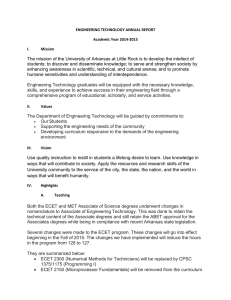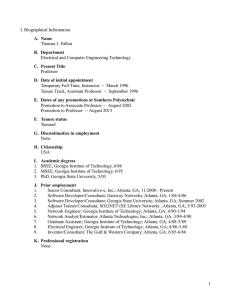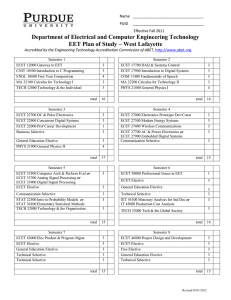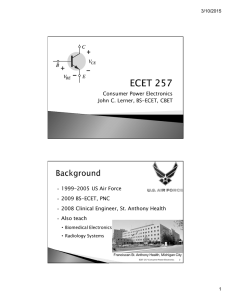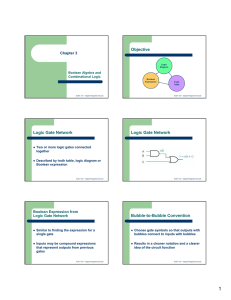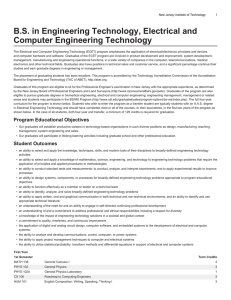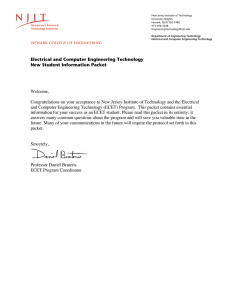ENGR 2103 – Electric Circuits I
advertisement
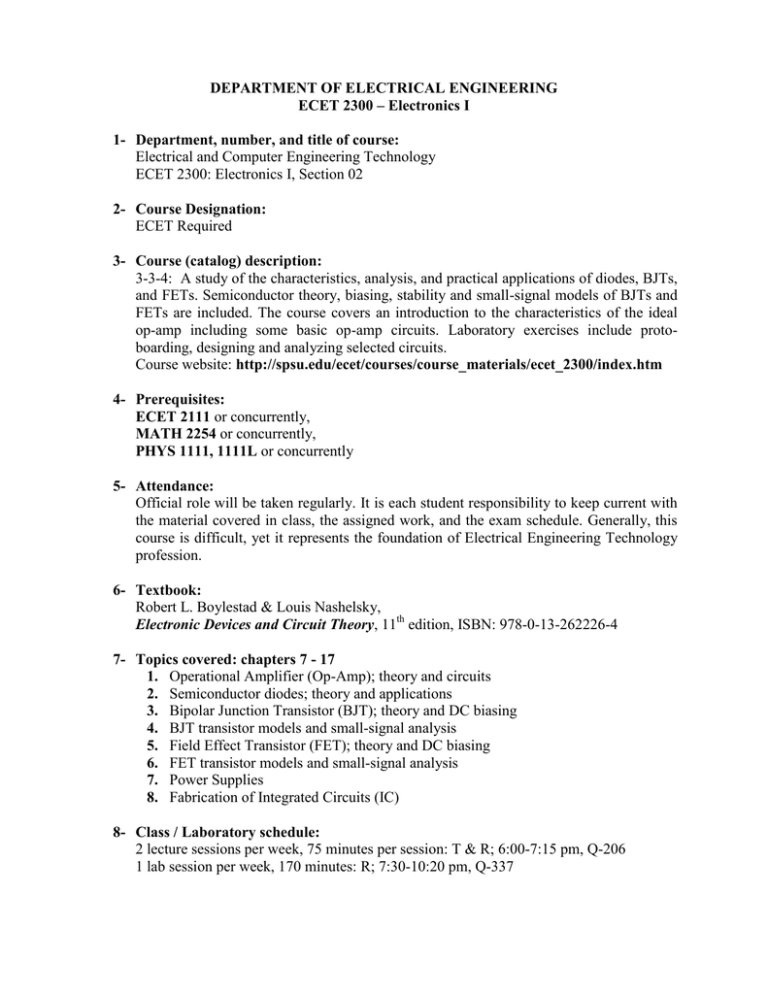
DEPARTMENT OF ELECTRICAL ENGINEERING ECET 2300 – Electronics I 1- Department, number, and title of course: Electrical and Computer Engineering Technology ECET 2300: Electronics I, Section 02 2- Course Designation: ECET Required 3- Course (catalog) description: 3-3-4: A study of the characteristics, analysis, and practical applications of diodes, BJTs, and FETs. Semiconductor theory, biasing, stability and small-signal models of BJTs and FETs are included. The course covers an introduction to the characteristics of the ideal op-amp including some basic op-amp circuits. Laboratory exercises include protoboarding, designing and analyzing selected circuits. Course website: http://spsu.edu/ecet/courses/course_materials/ecet_2300/index.htm 4- Prerequisites: ECET 2111 or concurrently, MATH 2254 or concurrently, PHYS 1111, 1111L or concurrently 5- Attendance: Official role will be taken regularly. It is each student responsibility to keep current with the material covered in class, the assigned work, and the exam schedule. Generally, this course is difficult, yet it represents the foundation of Electrical Engineering Technology profession. 6- Textbook: Robert L. Boylestad & Louis Nashelsky, Electronic Devices and Circuit Theory, 11th edition, ISBN: 978-0-13-262226-4 7- Topics covered: chapters 7 - 17 1. Operational Amplifier (Op-Amp); theory and circuits 2. Semiconductor diodes; theory and applications 3. Bipolar Junction Transistor (BJT); theory and DC biasing 4. BJT transistor models and small-signal analysis 5. Field Effect Transistor (FET); theory and DC biasing 6. FET transistor models and small-signal analysis 7. Power Supplies 8. Fabrication of Integrated Circuits (IC) 8- Class / Laboratory schedule: 2 lecture sessions per week, 75 minutes per session: T & R; 6:00-7:15 pm, Q-206 1 lab session per week, 170 minutes: R; 7:30-10:20 pm, Q-337 9- Evaluation of Student Performance Examinations: Each chapter will be concluded with a 10-minutes test. There will be three 50-minutes Term-Exams, and one 120-minutes Final-Exam. Homework: will be graded, and will be collected every week. All “review questions” and all “problems” at the end of each chapter are assigned as homework for each respective chapter. The homework will be presented on engineering paper. No exceptions! Laboratory: each student enrolled in ECET 2300 must earn a passing grade in the lab (Grade. 60%) in order to successful complete the course. No exceptions! 10- Grading The final grade is comprised of grades earned from three “partial examinations”, chapter tests, a final examination, and the grade earned from the lab. The formula used to compute the final grade is: Partial Exams: 30% Final Exam: 20% Chapter Tests: 10% Homework: 10% Laboratory: 30% Final “letter grade”: A: grade > 89.9 B: 89.9 > grade > 79.9 C: 79.9 > grade > 69.9 D: 69.9 > grade > 59.9 F: 59.9 > grade 11- Instructor Florian Misoc, Ph.D., P.E. Office: Q-148 Phone: (678) 915-7423 e-mail: fmisoc@spsu.edu Office Hours: As posted Website: http://educate.spsu.edu/fmisoc/ Calculators: It is preferred that the calculators used for this class be those approved by the Board of Professional Licensure (for examination purpose only)! No I-Phone, I-Pad, web-enhanced cell-phones are allowed for computations during examinations! 12- SPSU Honors Code: www.spsu.edu/honorcode As a member of the Southern Polytechnic State University community of scholars, I understand that my actions are not only a reflection on myself, but also a reflection on the University and the larger body of scholars of which it is a part. Acting unethically, no matter how minor the offense, will be detrimental to my academic progress and selfimage. It will also adversely affect all students, faculty, staff, the reputation of this University, and the value of the degrees it awards. Whether on campus or online, I understand that it is not only my personal responsibility, but also a duty to the entire SPSU community that I act in a manner consistent with the highest level of academic integrity. Therefore, I promise that as a member of the Southern Polytechnic State University community, I will not participate in any form of academic misconduct. I also understand that it is my responsibility to hold others to these same standards by addressing actions that deviate from the University-wide commitment to working, living, and learning in an environment conducive to a quality education. Thus, I affirm and adopt this honor code of Southern Polytechnic State University.
